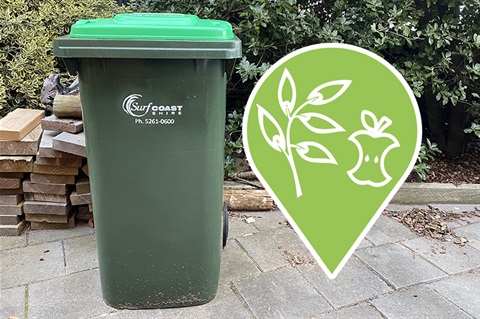FOGO

A Food Organics and Garden Organics (or FOGO) collection means you put all your food scraps (and we really do mean ALL) in the green bin with your garden waste.
Even foods you wouldn’t put in a home compost bin can be put in your FOGO bin:
- Bones left behind from rib night? No problem.
- That raw chicken that was in the fridge a little (or a lot) too long? We’ll take it.
- A huge pile of lemon peels and onions? Not sure what you were making, but stick it in.
- Mouldy bread and cheese? We accept!
What is accepted in the FOGO collection?
These food, garden and other organic materials are accepted in the green lid organics bin shire-wide:
- Ash (cold)
- Baked goods
- Bones (but not large dog bones)
- Branches - small
- Bread
- Cakes and pastries
- Cereal slops
- Cereals and grains
- Certified compostable bags/liners (AS 4736) - Cardia, Compost-a-pak and BioTuff brands only!
- Cheese
- Christmas trees (live)
- Chocolate
- Citrus
- Coffee grounds (no coffee pods)
- Dairy products
- Eggs and eggshells
- Flour
- Flowers
- Food scraps
- Fruits
- Garden clippings
- Grains
- Grass clippings
- Hair: human and pet
- Jelly
- Lawn clippings
- Leaves
- Leftover food
- Lollies
- Milk
- Meat (raw, cooked, and scraps)
- Nuts & seeds
- Onion
- Out of date food (no packaging)
- Paper towel (one or two, but not too many please)
- Pasta
- Pet poo
- Prunings and cuttings
- Rice
- Salad and dressing
- Seafood (including bones and shells)
- Spoiled food
- Sticks
- Straw and hay
- Take-away foods
- Tea leaves
- Thorny branches
- Tissues (one or two, but not too many please)
- Vegetables
- Weeds and weed seeds (no palm fronds)
- Yoghurt
DO NOT include in your organics bin:
- Bio packaging
- Branches too big to fit in the bin
- Cigarette butts
- Cling wrap
- Coffee filters
- Dirt, soil or sand
- Fish and chip paper
- Foil
- Garden tools or hoses
- Hazardous or medical waste such as sharps or sharps containers
- Household garbage
- Icy pole sticks
- Items that can be recycled
- Large dog bones
- Large logs or stumps
- Liquids
- Nappies or sanitary items
- Newspaper
- Packaging
- Painted or treated timber
- Paper bags
- Paper napkins (one or two is ok, but not too many)
- Paper plates
- Paper towel rolls
- Paper towels (one or two is ok, but not too many)
- Pizza boxes (place clean parts in the recycle bin. The greasy part can go in FOGO but just one or two please)
- Plant pots
- Plastic
- Plastic bags (even if biodegradable - see accepted certified compostable bags/liners in the list above)
- Shredded paper (1-5 pages is ok, but not a whole tub)
- Skewers/chopsticks
- Sponges or cloths
- Stones, rocks, bricks or rubble
- Tissues (one or two is ok, but not too many)
- Toilet rolls
- Wet wipes
Can I get a different size or extra FOGO bin?
You sure can.
- There is no cost to downsize bins.
- If you would like an extra FOGO bin there is a yearly fee.
- If you would like a larger FOGO bin there is a once-off fee.
View the form and costs
More FAQs about the FOGO bin
Because you are putting all that compostable material in your bin, we collect it every week.
Once it’s collected, your organic waste is turned into high quality compost and mulch products that is put to good use in parks, gardens and farms (instead of being buried in the landfill).
Caddies and compostable liners
We have provided every household with a bench top caddy and some compostable liners to help contain mess and smell, but you don’t have to use them.
The liners are certified compostable and made from corn, which will not contaminate the food and garden organics collection in any way.
You must not use other bags, including plastic, degradable, or biodegradable bags as they will contaminate the collection of organic material.
FAQs about the caddies and liners
What are the benefits of FOGO?
Your organic waste is turned into high quality compost and mulch products that meet Australian standards and is put to good use in parks, gardens and farms.
This is a much better option than sending organics to landfill where they produce methane, a toxic greenhouse gas 26 times more potent than carbon dioxide.
In your home, putting organics in the FOGO bin means less in your landfill bin. Also, any children in your life will learn that we live in a community that takes responsibility for how we manage our waste. Plus, it just feels good to know we are being part of the solution and contributing less to the problem when it comes to the climate crisis.